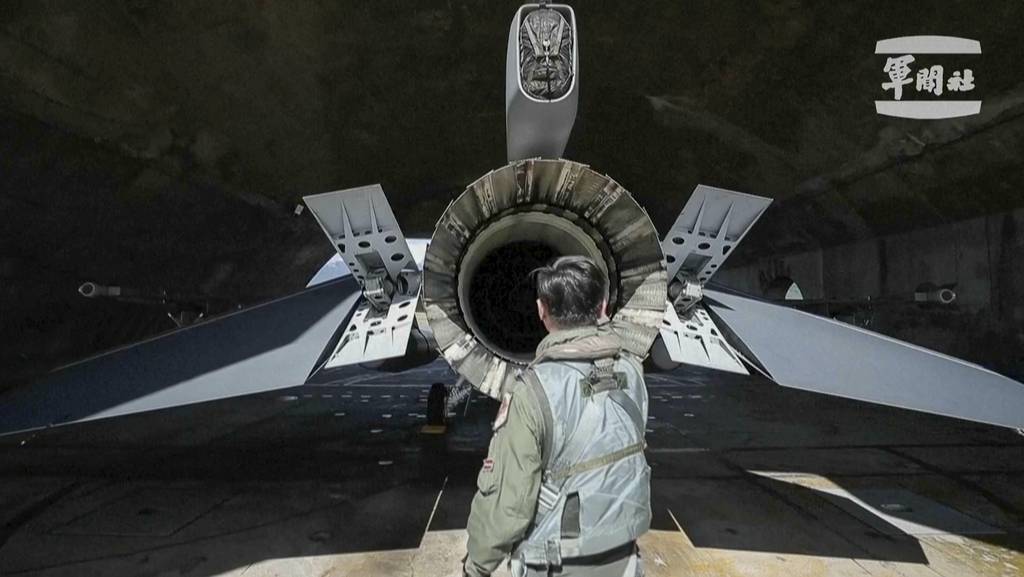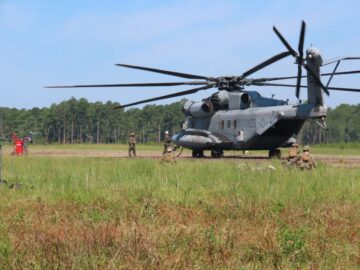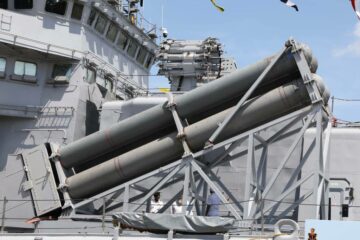
WASHINGTON (AP) — The Biden administration has approved the first-ever U.S. military transfer to Taiwan under a program generally reserved for assistance to sovereign, independent states.
The State Department notified Congress of the sale on Wednesday. It said the material would “be used to strengthen Taiwan’s self-defense capabilities through joint and combined defense capability and enhanced maritime domain awareness and maritime security capability.”
The package is modest — only $80 million of what Congress had set aside as a potential $2 billion — but the implications of using the so-called Foreign Military Financing program to provide it infuriated China.
Beijing, which regards Taiwan as a renegade province, has repeatedly refused to rule out the use of force to reunite it with the mainland and vociferously protests all U.S. arms sales to the self-governing island.
China’s foreign ministry immediately lashed out at the move, calling it a violation of U.S. commitments under its “one-China” policy and a number of subsequent agreements in which Washington pledged not to support Taiwanese independence.
“This severely violates the one-China principle and the stipulations of the three China-U.S. joint communiques,” ministry spokesman Wang Wenbin told reporters in Beijing on Thursday. “China deplores and firmly opposes it.”
Previous arms sales to Taiwan have been approved under other authorities that do not necessarily imply statehood. U.S. officials were quick to say that the provision of FMF funding to Taiwan did not represent a change in policy.
In explaining the change, two U.S. officials said: “The United States has provided Foreign Military Sales (FMS) to Taiwan for years. FMF simply enables eligible partner nations to purchase U.S. defense articles, services, and training through either FMS or, for a limited number of countries, through the foreign military financing of direct commercial contracts (FMF/DCC) program.” The officials were not authorized to comment publicly and did so on condition of anonymity.
But the language used implied that Taiwan is or could be compared to a “nation” or a “country” — something China has fervently opposed, blocking Taiwan’s full membership in any number of U.N. and other international organizations unless it is identified as part of China.
The only other time the U.S. has provided a non-nation-state with military assistance under FMF was to the African Union, an organization of sovereign states based in Ethiopia, according to American officials.
The notification, a copy of which was obtained by The Associated Press, did not specify what military equipment or systems would be paid for under FMF, which commits U.S. taxpayer dollars to pay for the supply of materiel to foreign countries.
But it said items that could be covered would include: air and coastal defense systems, armored vehicles, infantry fighting vehicles, drones, ballistic missile and cyber defenses, and advanced communications equipment. It added that protective gear, an array of small, medium and heavy weapons systems, ammunition, armored and infantry fighting vehicles could also be included.
In addition to equipment, FMF may also be used to support training for Taiwanese military forces.
Rep. Michael McCaul, a Texas Republican who chairs the House Foreign Affairs Committee, welcomed the FMF being provided to Taiwan.
“These weapons will not only help Taiwan and protect other democracies in the region, but also strengthen the U.S. deterrence posture and ensure our national security from an increasingly aggressive CCP,” he said in a statement, referring to the Chinese Communist Party.
—-
Associated Press writer Aamer Madhani contributed to this report.
- SEO Powered Content & PR Distribution. Get Amplified Today.
- PlatoData.Network Vertical Generative Ai. Empower Yourself. Access Here.
- PlatoAiStream. Web3 Intelligence. Knowledge Amplified. Access Here.
- PlatoESG. Automotive / EVs, Carbon, CleanTech, Energy, Environment, Solar, Waste Management. Access Here.
- PlatoHealth. Biotech and Clinical Trials Intelligence. Access Here.
- ChartPrime. Elevate your Trading Game with ChartPrime. Access Here.
- BlockOffsets. Modernizing Environmental Offset Ownership. Access Here.
- Source: https://www.defensenews.com/news/your-military/2023/08/31/us-oks-military-aid-to-taiwan-usually-reserved-for-sovereign-nations/
- :has
- :is
- :not
- 70
- a
- According
- added
- addition
- administration
- advanced
- Affairs
- African
- aggressive
- agreements
- Aid
- AIR
- All
- also
- American
- ammunition
- an
- and
- Anonymity
- any
- approved
- arms
- Array
- articles
- AS
- Assistance
- associated
- At
- Authorities
- authorized
- awareness
- based
- BE
- been
- Beijing
- being
- biden
- Biden Administration
- Billion
- blocking
- but
- by
- calling
- capabilities
- capability
- ccp
- change
- China
- chinese
- Chinese Communist Party
- combined
- comment
- commercial
- commitments
- committee
- Communications
- communications equipment
- compared
- condition
- Congress
- contracts
- contributed
- could
- countries
- covered
- cyber
- Defense
- Department
- DID
- direct
- do
- dollars
- domain
- Drones
- either
- eligible
- enables
- enhanced
- ensure
- equipment
- Ethiopia
- explaining
- fighting
- financing
- firmly
- first-ever
- For
- Force
- Forces
- foreign
- from
- full
- funding
- Gear
- generally
- had
- Have
- he
- heavy
- help
- House
- HTTPS
- identified
- images
- immediately
- implications
- implied
- in
- include
- included
- increasingly
- independence
- independent
- International
- island
- IT
- items
- ITS
- joint
- jpg
- language
- Limited
- mainland
- Maritime
- material
- May..
- medium
- membership
- Michael
- Military
- million
- ministry
- modest
- move
- National
- national security
- Nations
- necessarily
- notification
- number
- obtained
- of
- officials
- on
- only
- opposed
- or
- organization
- organizations
- Other
- our
- out
- over
- package
- paid
- part
- partner
- party
- Pay
- plato
- Plato Data Intelligence
- PlatoData
- policy
- potential
- press
- principle
- Program
- protect
- Protective
- Protests
- provide
- provided
- provision
- publicly
- purchase
- Quick
- regards
- region
- REPEATEDLY
- report
- represent
- Republican
- reserved
- Rule
- s
- Said
- sale
- sales
- say
- security
- Services
- set
- severely
- simply
- small
- So
- something
- sovereign
- State
- State Department
- Statement
- States
- Strengthen
- subsequent
- supply
- support
- Systems
- Taiwan
- Taxpayer
- texas
- that
- The
- The Chinese Communist Party
- this
- three
- Through
- thursday
- time
- to
- Training
- transfer
- two
- u.s.
- under
- union
- United
- United States
- us
- US military
- use
- used
- using
- Vehicles
- VIOLATION
- was
- washington
- Weapons
- Wednesday
- welcomed
- were
- What
- which
- WHO
- will
- with
- would
- writer
- years
- zephyrnet












